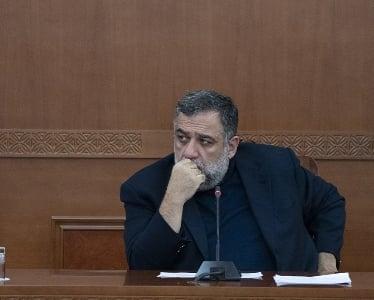Karabakh state minister: We must be honest before our people, honestly say our decision, try to implement it

This is one of the most important, historical situations of the entire Armenian nation which it doesn’t sense and doesn’t react with as much force as it should have. Artsakh (Nagorno-Karabakh) Minister of State Ruben Vardanyan said this in an interview to 5th Channel television of Armenia—and answering the question whether he has any dissatisfaction with the efforts being made by Armenia’s authorities in the current situation.
"On my part, the uneasiness, or some emotion of dissatisfaction comes from the feeling that this is not the problem of Artsakh, not that a response should be made to some difficulties of the people living in Artsakh, but this is one of the most important, historical situations of the entire Armenian nation which we don't sense and don't react with as much force as we should have because the sensitivity, the feeling that this is historically important can be our mistake if we don't fight for Artsakh calmly, or not calmly, but without fighting until the end, or rather by 100 percent. It does not mean that it is zero [percent]; it’s just that we do not 100 percent sense the importance of what is happening in Artsakh and why the future of Artsakh will affect both Armenia and the Armenian world. There is indifference among some [Armenians]. But I want to point out again that Artsakh is a pan-Armenian issue; if we lose Artsakh, we will lose one of our most important roots, which is very important," he said.
Referring to the Azerbaijani foreign minister’s criticism of him that he allegedly does not allow the people of Artsakh to "reintegrate" into Azerbaijan, the Minister of State said that he has a different point of view in this regard, and the people of Artsakh should all decide together that they are fighting and will be fighting.
"We must be honest before our people, honestly say our decision, and try to implement it because that half-lie, half-truth, half-talk leads to the most serious thing that people lose their faith in the leadership, in the leaders. Decisions should be clear and should be implemented, and people should be sure that there are no second, third layers under these decisions, and they are not resolving their personal problems," he said.
For 18 days now, Azerbaijani “environmentalists” have kept the Berdzor (Lachin) corridor—linking Artsakh to Armenia—closed, leaving Artsakh in a complete blockade, whose 120 thousand citizens—including 30 thousand children—are on the verge of a humanitarian crisis.
 Latest news
Latest news Latest news
Latest newsRomania Modernizes Ground Forces Training with Cubic Defense: A Step to Strengthen NATO’s Eastern Flank
20.Feb.2026
Greece Plans to Exclude Turkiye from Future Defense Contracts
20.Feb.2026
U.S.-Based Mars Launches Major Investment Project in Kazakhstan
20.Feb.2026
Parliamentary Elections 2026 in Armenia as a Geopolitical Referendum
20.Feb.2026
Russia and Ukraine Fail to Reach Agreement in Geneva
19.Feb.2026
The South Caucasus in U.S. Foreign Policy: Implications of High-Level Visits for Russian and Chinese Regional Aspirations
18.Feb.2026
Ukraine Imposes Personal Sanctions on Belarusian President Alexander Lukashenko
18.Feb.2026
72% Against the Authorities: Economic Dissatisfaction Hits Record Levels in Turkiye
17.Feb.2026
Bulgaria Strengthens Defense: First American Stryker Vehicles Delivered
17.Feb.2026
Moscow Criticizes Plans to Build a U.S.-Backed Nuclear Power Plant in Armenia
16.Feb.2026

 28 Feb 2026
28 Feb 2026









